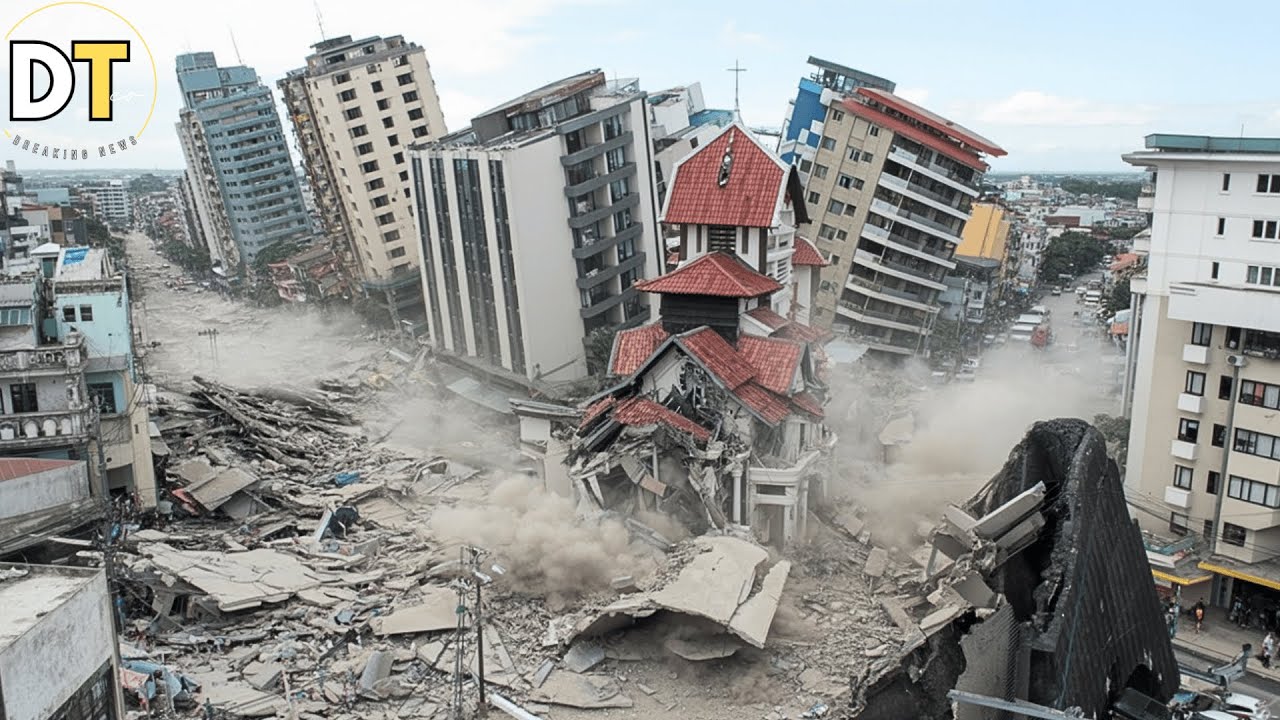Massive 6.9 Earthquake in Philippines Now! Cebu Shook,People in Panic!
What? On Tuesday evening, September 30th, 2025, at
9:59 p.m., a 6.9 magnitude earthquake struck off the coast of Bogo City, Cebu Province, in the
central Visayas region of the Philippines. Due to its shallow focus and widespread impact,
this disaster was felt not only in Cebu, but also violently in neighboring regions such as
Lee, Samar, and Negros oriental, plunging hundreds of thousands of people into panic and deeply
disrupting historical structures and daily life. According to data from the Philippine
Institute of Volcanology and Seismology, the epicenter of the earthquake was determined to
be approximately 17 km northn northeast of Bogo City located in northern Cebu. Recorded at a depth
of only 10 km, this tremor had a more devastating effect in the region. Because, as is typical
of shallow earthquakes, it occurred very close to the surface. Initial reports indicate that the
earthquake was felt particularly strongly in Cebu City and parts of Lee, shaking buildings in many
locations and causing unsecured objects to fall. Historical and religious buildings in northern
Cebu were also affected by this powerful tremor. In particular, the centuries old Santa
Rosa de Lima Cathedral in the town of Dan Bontayan partially collapsed after the earthquake.
Community members shared messages on social media, both announcing the extent of the destruction
and expressing their concern for the region. At the same time, images of the Parochia de
San Pedro, a postal church on Bantean Island, shaking violently during the
earthquake, spread rapidly on social media, revealing that the region’s
religious heritage was at serious risk. Following the earthquake, not only religious
buildings, but also educational and daily life activities came to a standstill. It
was announced that classes at all levels in Lapu Lapu City and Talesy City, two important
centers in Sibu would be suspended on Wednesday, October 1st. Similarly, Mandawi city along with
the municipalities of Minglanila and Consolion announced that it had suspended schooling
due to the earthquake. This decision was presented to the public as a necessary measure
for the safety of both students and teachers. During and after the earthquake, there
was serious panic throughout the Visayas. In the minutes after the tremors began,
residents of the region fled their homes in fear. The crowds and chaos created
by people pouring into the streets, especially in densely populated areas of
Sibu, demonstrated the extent of the fear. These scenes were widely shared on social
media and resonated around the world. According to assessments, instrumental
intensity 6 was recorded in Cebu City and the Valaba region of Lee. This level indicates
a tremor powerful enough to cause buildings to shake noticeably and unsecured objects to
fall over. Residents in San Fernando, Cebu, reported feeling the earthquake at intensity
3, while intensity 2 was recorded in Laang, northern Samar. These varying intensity
levels clearly demonstrated that the earthquake spread over a wide area and its
effects were not limited to the epicenter. The German Research Center for Geossciences
also shared its earthquake data shortly after the event. According to the center, the 6.9
magnitude tremor near Cebu City was recorded just a few minutes earlier with its epicenter at a
depth of 10 km. This earthquake strongly reflected on the surface due to its shallow structure.
According to GFZ preliminary seismic data, the earthquake was strongly felt by everyone
living in areas close to the epicenter. Following the earthquake, regional authorities
warned citizens about aftershocks. Ivy announced that aftershocks could occur in the coming
days and that the public should therefore be cautious. This warning following the
earthquake further increased anxiety among the public. This is because the
local population had not forgotten the damage caused by the destructive aftershocks
that followed earthquakes in previous years. In summary, the 6.7 magnitude earthquake
that struck near the city of Bogo in Cibbu on September 30th, 2025 had a significant impact
both physically and psychologically due to its shallow focus which caused it to be felt over a
wide area, damage to historic religious buildings, the suspension of educational activities, and
the public fleeing in panic to the streets. While anxiety persists in the region
due to the expectation of aftershocks, this earthquake has once again forced the
Philippines to face the reality of earthquakes. We extend our condolences to all those affected
by this devastating earthquake in the Cebu region of the Philippines. We hope that the wounds
will heal as soon as possible. Don’t forget to subscribe to our channel to get the latest and
most accurate information about natural disasters.
On the evening of Tuesday, September 30, 2025, a magnitude 6.9 earthquake struck off the coast of Bogo City in Cebu. Due to its shallow depth, the quake was strongly felt across Cebu, Leyte, Samar, and Negros Oriental. Historic religious structures were damaged, classes were suspended, and thousands of residents rushed into the streets in panic. Authorities have issued warnings about possible aftershocks, and fear continues to grip the region.
#Philippines
#Cebu
#Earthquake
#6.9Magnitude
Thank you for your understanding. This content is shared under Section 107 of the Copyright Act of 1976, within the framework of “fair use,” for educational, news reporting, and public awareness purposes. Our channel aims to provide informative coverage of natural disasters, raising public awareness and delivering detailed analysis of events. If you have any copyright concerns or objections, please contact us at: Disastertodayy@gmail.com
Cebu earthquake
Philippines earthquake
Philippines breaking earthquake news
Visayas earthquake today
Cebu earthquake today
Philippines earthquake today
6.9 earthquake breaking news

